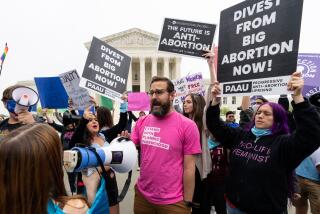High Court to Review ‘Baby Doe’ Rules : Federal Regulation of Treatment of Defective Newborns Faces Test
WASHINGTON — The Supreme Court agreed Monday to review the Reagan Administration’s controversial “Baby Doe” regulations in a test of how far the federal government may go to investigate and regulate medical treatment for babies born with severe defects.
In a brief order, the court said that it would hear an appeal next term from the Department of Health and Human Services, which is contesting a federal appeals court decision that blocks the Administration from interceding in such cases under a federal law that bars discrimination against the handicapped.
The controversy emerged after so-called “Baby Doe” cases in Indiana and New York in which parents and hospitals refused to treat newborn infants with severe impairments. The Administration has tried to require treatment in such cases but thus far has been thwarted by court decisions.
Parents Rejected Surgery
The Administration first issued regulations after an incident in 1982 in Indiana in which the parents of a child born with Down’s syndrome and a blocked esophagus ruled out life-saving surgery for the infant, who eventually died. Those rules were struck down.
New rules were drawn up and the Administration tried to invoke them in another “Baby Doe” case in New York involving an infant born with an open spine, excess fluid on the brain and an abnormally small head. Eventually, the parents consented to surgery, and the child survived. Meanwhile, those rules were invalidated.
At issue before the court now are HHS rules issued in 1984, allowing the federal government to investigate denial of life-saving treatment to handicapped newborns. The regulations require treatment unless it would only prolong an inevitable death and prohibit the withholding of treatment solely at the request of the parents. Federal financial assistance would be withheld from hospitals that deny treatment to impaired infants solely because of their handicaps.
Those rules were challenged by the American Hospital Assn. and other organizations as exceeding the scope of the federal Rehabilitation Act of 1973, the law barring discrimination against the handicapped. A federal trial court agreed, and last December the U.S. 2nd Circuit Court of Appeals in New York affirmed the decision preventing the rules from going into effect.
The Administration appealed to the high court (Heckler vs. American Hospital Assn., 84-1529), contending that refusals to treat even moderately handicapped newborn children had become “more than just a rare occurrence.” The absence of federal protection, the Administration said, “may in some cases be life-threatening.”
Lawyers for the American Hospital Assn. urged the justices to leave the appellate ruling intact, contending that the states were adequately empowered to protect against cases of medical neglect. They said also that Congress, in recently enacting amendments to the federal Child Abuse Act, had assured treatment for severely handicapped infants unless death appears inevitable.
In addition, the court accepted for review two novel cases raising the question of how far government must go to accommodate individual religious beliefs.
In the first case, the justices will decide whether the government may require food stamp recipients to provide Social Security numbers despite their religious objections. At issue is the refusal by the parents of a 4-year-old Indian girl, named Little Bird of the Snow, to submit her number because they believe numbers are a “great evil” (Heckler vs. Roy, 84-780).
In the second case, the court will decide whether the military validly prohibited an Air Force officer who is an Orthodox Jew from wearing a yarmulke, or skullcap, while on active duty (Goldman vs. Weinberger, 84-1097).
In other action, the court:
--Agreed to decide whether the City Council of Los Angeles improperly refused to renew the franchise of the Yellow Cab Co. in 1981 during a strike against the firm by the Teamsters Union. Lawyers for the company, now bankrupt, contended that the council’s action represented interference in a labor dispute in violation of federal labor laws (Golden State Transit vs. City of Los Angeles, 84-1644).
--Refused to hear an appeal from Cable News Network challenging long-standing rules against the use by news media of cameras, microphones and tape recorders in federal courtrooms. Although many states--including California--have relaxed rules against news cameras and electronic devices, federal courts have maintained such bans on the grounds that audio and visual coverage would be disruptive and distracting (CNN vs. U.S. District Court, 84-1377).
More to Read
Sign up for Essential California
The most important California stories and recommendations in your inbox every morning.
You may occasionally receive promotional content from the Los Angeles Times.










